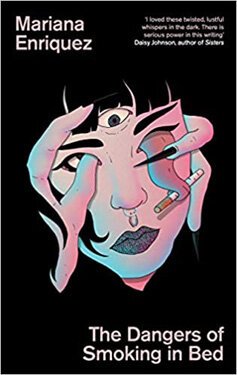It's so exciting to read new fiction that imaginatively blends the surreal and supernatural to tell inventive (oftentimes horrific) literary tales. In Enriquez's short stories the narrators are often haunted by ghosts or plagued by curses. Spirits enact their revenge. Communities are driven into a frenzy by fear. These stories frequently focus on or are told through the points of view of the vulnerable and maligned: children who are impoverished or abused, disenfranchised teenagers or deviants. Neither the protagonists or the ethereal beings often adhere to a moral code. Many act deviously, tyrannically or selfishly. An abused woman is entrapped by a hotel's ghost. The “evil” which plagues a family is transferred onto an innocent girl. A young filmmaker knowingly films and sells videos of children swimming in a pool to a paedophile. The depiction of the sheer chaos of this society which doesn't necessarily reward the good or punish the bad is in many ways more terrifying than the sensational violence or gross details portrayed. It suggests a world that is restless and unhinged. These tales are filled with a lot of tantalizingly dark detail and imagery, but the problem is they too often rely on a twist or gimmick in their plotting. This frequently left me reeling (or rolling my eyes) from the shock of what's revealed rather than being moved by any profundity or psychological insight.
Interestingly, I felt the final story in this collection 'Back When We Talked to the Dead' was the most successful. This is narrated from the collective point of view of a group of girls recalling a time when they secretly met to use a Ouija Board in order to contact or locate people they've lost. Their connection with the spirits is severed one night when a session ends in a terrifying way. This story hints at institutionalized violence which has led to people disappearing or falling between the cracks of a dysfunctional social system. The point of view evocatively brings to life the voices of friends who were once united but have grown apart because of age and the abiding fear of their actions. It's also genuinely tense and scary as we discover what freaked out these girls so much. Sadly, too many of the previous tales feel like they are self-consciously striving to disturb the reader. Two stories feature people defecating in the streets and multiple female characters aggressively and violently masturbate. I'm not prudish but the repetition of these kinds of details simply revolted me rather than engaged me. I can't see anything revelatory in this specific realism; it's just stomach turning.
The longest story in this book 'Kids Who Come Back' is almost novella-length and explores a theme common to many of the stories. Children frequently disappear in this collection only to return in an altered state where all innocence has been lost. This lengthy story is narrated from the point of view of a woman named Mechi who literally maintains an archive of lost and disappeared children in Buenos Aires. She becomes fascinated by a beautiful missing girl named Vanadis who abruptly returns one day, but not in as the person she was before. Many other lost children also reappear including many of whom definitely died and they are the same age they were when they vanished. People grow to fear them and see them as shells of the children they once were. This is a premise somewhat similar to another Argentinian story 'Underground' by Samanta Schweblin. I feel like Enriquez is able to more effectively build and draw out tension and mystery in this longer story. It better describes doubles or doppelgängers which appear in several tales. It's also more pointed in how it encapsulates a frequent theme of this collection where a neighbourhood or area and a group of people are “tainted” by a scandal or popular myth so they are in a sense “cursed”. The resulting social alienation is just as cruel as the rancour of the spirits. Perhaps the many positive elements of this longer story mean that I'd find Enriquez's fiction more successful in the form of a novel where her rich imagination can be given a constructive amount of room to stretch.








